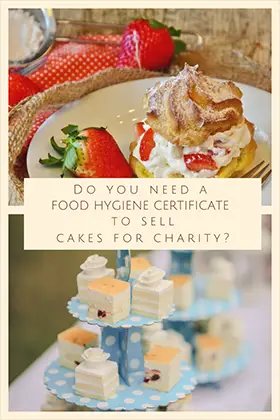
Cake sales are often an important part of charity fund-raising efforts, however in recent years a lot of conflicting information about what requirement are when it comes to food safety training, with some charities spending a fortune on training for volunteers and others stopping holding events altogether. Below we will look at what the requirements are for fundraisers, school fates and similar events.
In Brief:
You do not need a specific food hygiene certificate to produce and sell food at charitable events such as fete’s, coffee mornings or fundraisers. You must however ensure it is safe to eat and produces by a competent person. Completing a food hygiene certificate is however one way to show a person is competent.
The main cause of confusion on this topic is down to the difference between a registered food business and a charity style event. Operators of registered food businesses are required to keep detailed food hygiene documentation as part of a comprehensive Food Hygiene Management System. For registered businesses a certified external training course is always preferable. This is not the case for charity events such as school and village fates as the law which starts this specifically excludes these events.
“Operations such as the occasional handling, preparation, storage and serving of food by private persons at events such as church, school or village fairs are not covered by the scope of the Regulation. - Recital 9 of Regulation (EC) No 852/2004.
You only need to register your event as a food business if it has “A certain continuity of activity” and “A certain degree of organisation”. These definitions are not as clear cut as they may sound and you can find out more on the subject in our article here. As above Church & school fetes, charity events and the like are extremely unlikely to need to register unless you are opening a full time charity cafe.
So, as a charity event you need to ensure that the food and drinks you sell or provide are safe and that all production is carried out in a way that is same and you take all the precautions a reasonable, competent person would take. For cakes specifically you should think about
Transport and store cakes in a clean, sealable container
Have separate utensils for cooked and uncooked items when serving
Some types of icing, such as ganache and buttercream, do not need to be kept refrigerated. It’s best to store them somewhere cool and dry.
If you don’t need to be registered as a food business, you currently do not have to provide written information for consumers about allergens present in the food as ingredients. However due to several high profile incidents with allergens in the news, the law is likely to soon be changed. It is currently unclear if the new law will require you to have written allergen lists at cake sales. You should at the very least be able to tell customers what allergens are in every cake so you should try and get this information off of whoever cooks the cake. If you cannot get this information then you should say that you cannot guarantee they are allergen free when asked.
Although it is not necessary, it isn’t uncommon for people who hold these kind of event semi-regularly to decide that they would like to have some formal training. In most cases, such as for cake stalls and coffee mornings a level 1 course would be more than sufficient. If you were running something like a soup kitchen or charity meal where higher risk foods such as fish or rare steaks are being served then you might decide a level 2 certificate would be appropriate.
As we have said, in this case they are not mandatory, you just have to be safe, and years of cooking and safely holding similar events can prepare you for that, so there is no need to panic and cancel events or spend a fortune on training courses for everyone involved. If you are worried then you could always have one person complete an online course and have them oversee the event and provide advice.
If you would like more information on if you need to register as a business you can check out the article here and for a general over view of Food Hygiene Training try What level food hygiene certificate do I need?